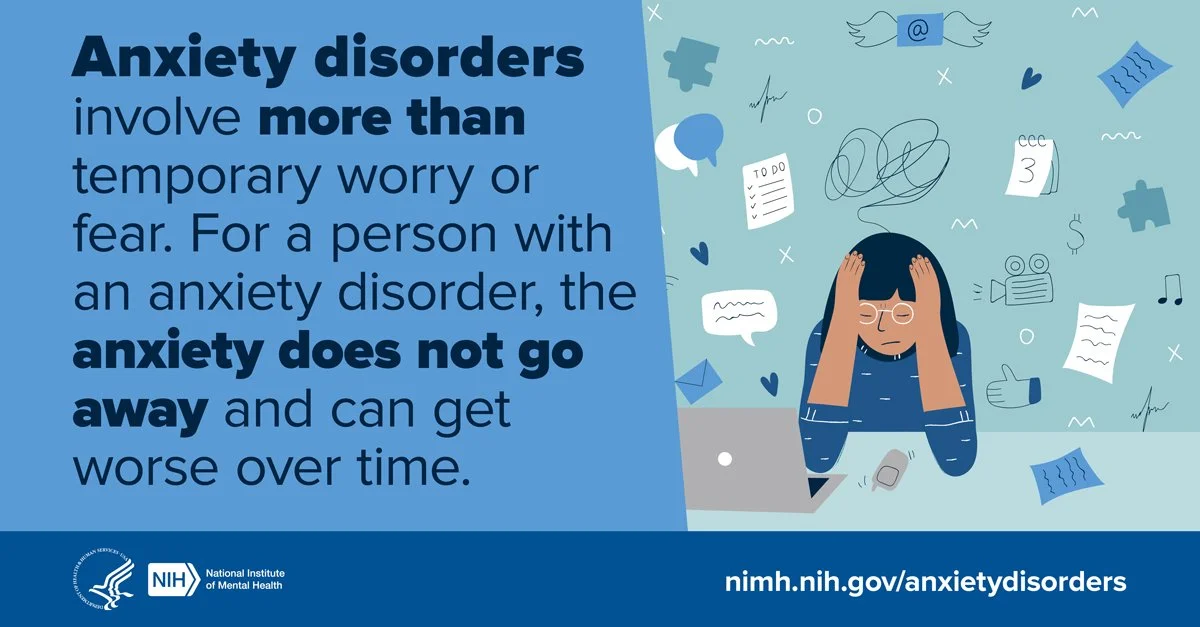Understanding Generalized Anxiety Disorder (GAD): Symptoms, Management, and Treatment
Generalized Anxiety Disorder (GAD) is a common mental health condition characterized by excessive and persistent worry about various aspects of life (NIMH). It can significantly impact an individual's daily functioning, but is a treatable condition. In this psychoeducation article, we will explore what GAD is, how it can manifest, and effective ways to manage and treat it.
Santa Barbara Anxiety Therapy
Symptoms of generalized anxiety disorder can vary.
What is Generalized Anxiety Disorder (GAD)?
GAD is a chronic anxiety disorder characterized by excessive and uncontrollable worry about a wide range of everyday concerns. These worries often revolve around issues such as health, work, relationships, finances, and personal safety. GAD can manifest in both physical and psychological symptoms and can be quite distressing (NIMH).
Symptoms of Generalized Anxiety Disorder can vary.
Mental symptoms may include:
Persistent worrying or anxiety about areas that are out of proportion to the impact of the events
Overthinking plans and solutions to all possible worst-case outcomes
Perceiving situations and events as threatening, even when they aren't
Difficulty handling uncertainty
Indecisiveness and fear of making the wrong decision
Inability to set aside or let go of a worry
Inability to relax, feeling restless, and feeling keyed up or on edge
Difficulty concentrating, or the feeling that your mind "goes blank"
Physical Symptoms may include:
Fatigue
Trouble sleeping
Muscle tension or muscle aches
Trembling, feeling twitchy
Nervousness or being easily startled
Sweating
Nausea, diarrhea or irritable bowel syndrome
Irritability
Source: Mayo Clinic
Treatment Options for GAD
Psychotherapy (Talk Therapy): Cognitive-Behavioral Therapy (CBT) is one of the most effective psychotherapy approaches for GAD. CBT helps individuals identify and challenge their irrational thought patterns, teaching them healthier ways to cope with anxiety.
Medication: In some cases, medication may be prescribed to manage the symptoms of GAD. Common medications include selective serotonin reuptake inhibitors (SSRIs) and benzodiazepines. Medication should always be prescribed and monitored by a qualified healthcare professional.
Lifestyle Modifications: Lifestyle changes can complement therapy and medication in managing GAD. These may include regular exercise, a balanced diet, adequate sleep, and stress-reduction techniques like meditation or yoga.
Relaxation Techniques: Learning relaxation techniques such as deep breathing, progressive muscle relaxation, or mindfulness can help individuals manage anxiety symptoms. Click here for some relaxation exercise ideas!
Support Groups: Joining a support group or seeking social support from friends and family can be invaluable in managing GAD. Sharing experiences with others who understand can reduce feelings of isolation. Do a quick google search using keywords like “Anxiety group therapy near me” to find a group close to you. The Anxiety & Depression Association of America (ADAA) has a great resource guide to finding one to join.
Managing GAD
Seek Professional Help: If you feel anxiety is significantly impacting your daily life, seeking assistance from a mental health expert can be beneficial in effectively managing and addressing the condition. At Botaitis Therapy Group, we offer Santa Barbara therapy, Goleta therapy, Montecito therapy, and Carpinteria therapy services for clients seeking support with anxiety.
Educate Yourself: Learning about GAD can help you better understand your condition and what to expect from treatment. This article, Why anxiety should not be feared, by the ADAA provides a great perspective on managing anxiety.
Follow Treatment Recommendations: Be consistent with therapy, medication, and lifestyle changes recommended by your healthcare provider.
Self-Care: Prioritize self-care practices such as regular exercise, a balanced diet, and sufficient sleep to support your mental well-being.
Build a Support System: Share your experiences with trusted friends and family members or consider joining a support group to connect with others who have similar challenges.
Generalized Anxiety Disorder is a treatable condition that affects about 3% of the adult population (Cleveland Clinic). With the right combination of therapy, medication, and lifestyle changes, individuals with GAD can learn to manage their symptoms effectively and improve their overall quality of life. Seeking help is a sign of strength.
Many of our clinicians at Botaitis Therapy Group specialize in working with clients that have anxiety. Santa Barbara anxiety therapy, Goleta anxiety therapy, Montecito therapy, and Carpinteria therapy services are available, and we also offer telehealth counseling for those who prefer virtual sessions.
Reach out to us to schedule a free 15 minute consultation call at 805-636-9890 or fill out this form.

